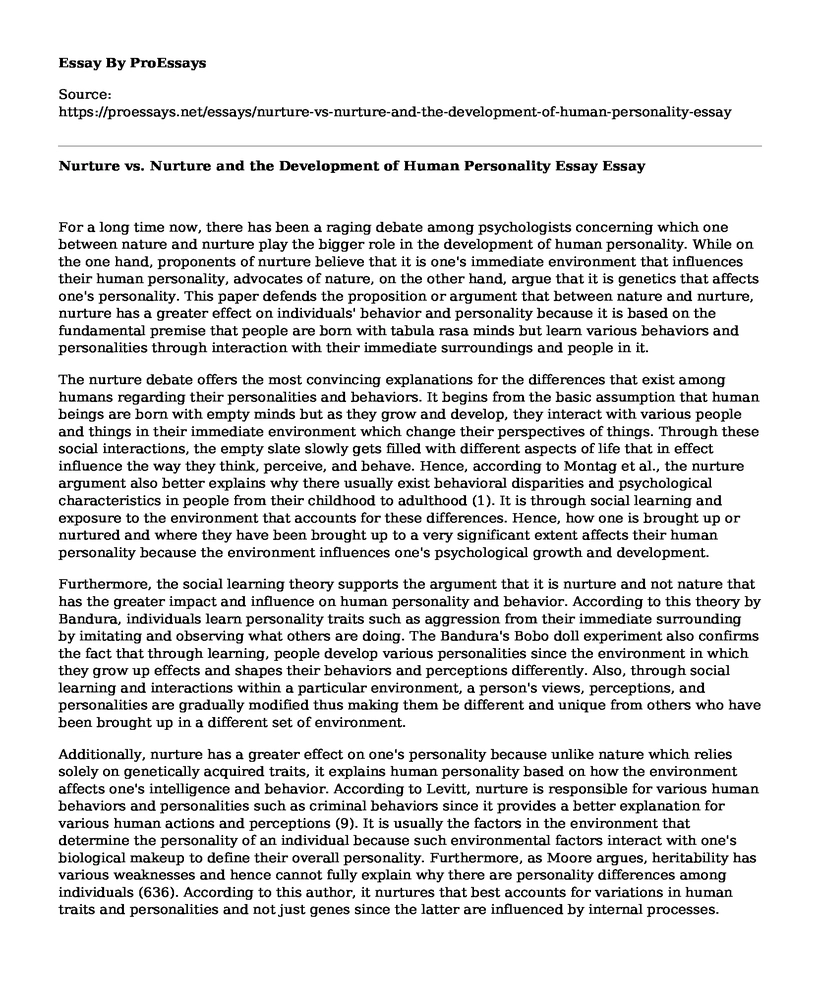For a long time now, there has been a raging debate among psychologists concerning which one between nature and nurture play the bigger role in the development of human personality. While on the one hand, proponents of nurture believe that it is one's immediate environment that influences their human personality, advocates of nature, on the other hand, argue that it is genetics that affects one's personality. This paper defends the proposition or argument that between nature and nurture, nurture has a greater effect on individuals' behavior and personality because it is based on the fundamental premise that people are born with tabula rasa minds but learn various behaviors and personalities through interaction with their immediate surroundings and people in it.
The nurture debate offers the most convincing explanations for the differences that exist among humans regarding their personalities and behaviors. It begins from the basic assumption that human beings are born with empty minds but as they grow and develop, they interact with various people and things in their immediate environment which change their perspectives of things. Through these social interactions, the empty slate slowly gets filled with different aspects of life that in effect influence the way they think, perceive, and behave. Hence, according to Montag et al., the nurture argument also better explains why there usually exist behavioral disparities and psychological characteristics in people from their childhood to adulthood (1). It is through social learning and exposure to the environment that accounts for these differences. Hence, how one is brought up or nurtured and where they have been brought up to a very significant extent affects their human personality because the environment influences one's psychological growth and development.
Furthermore, the social learning theory supports the argument that it is nurture and not nature that has the greater impact and influence on human personality and behavior. According to this theory by Bandura, individuals learn personality traits such as aggression from their immediate surrounding by imitating and observing what others are doing. The Bandura's Bobo doll experiment also confirms the fact that through learning, people develop various personalities since the environment in which they grow up effects and shapes their behaviors and perceptions differently. Also, through social learning and interactions within a particular environment, a person's views, perceptions, and personalities are gradually modified thus making them be different and unique from others who have been brought up in a different set of environment.
Additionally, nurture has a greater effect on one's personality because unlike nature which relies solely on genetically acquired traits, it explains human personality based on how the environment affects one's intelligence and behavior. According to Levitt, nurture is responsible for various human behaviors and personalities such as criminal behaviors since it provides a better explanation for various human actions and perceptions (9). It is usually the factors in the environment that determine the personality of an individual because such environmental factors interact with one's biological makeup to define their overall personality. Furthermore, as Moore argues, heritability has various weaknesses and hence cannot fully explain why there are personality differences among individuals (636). According to this author, it nurtures that best accounts for variations in human traits and personalities and not just genes since the latter are influenced by internal processes.
Conclusion
In summary, therefore, nurture plays a greater role in influencing and affecting human personality because it provides the more convincing argument about human personality, intelligence, traits, and behaviors. Nurture also accounts for the psycho logical differences in individual characteristics since it explains human personality from a developmental and social learning perspective. Most importantly, it is nurture which affects human personality most because it provides an explanation based on the basic assumption that humans are born with empty minds that gradually mature and develop through learning, interactions, and modeling.
Works Cited
Levitt, Mairi. Perceptions of Nature, Nature, and Behavior. Life Science and Social Policy, vol.9, 2013, pp. 9-13
Montag, Christian, Elisabeth Hahn, Martin Reuter, Frank M. Spinath, Ken Davis, and Jaak Panksepp. Differences in Primary Emotional Systems: Evidence from a Twin Study. PLoS One, vol. 11, no. 6, 2016, pp. 1-15
Moore, David S. "Current Thinking About Nature and Nurture." By K. Kampourakis (ed.), ThePhilosophy of Biology: A Companion for Educators, History, Philosophy and Theory ofthe Life Sciences, pp. 629-652. Springer Science+Business Media Dordrecht, 2013
Cite this page
Nurture vs. Nurture and the Development of Human Personality Essay. (2022, May 09). Retrieved from https://proessays.net/essays/nurture-vs-nurture-and-the-development-of-human-personality-essay
If you are the original author of this essay and no longer wish to have it published on the ProEssays website, please click below to request its removal:
- Choice of Destiny in Literature Essay
- Paper Example on Assessment and Treatment of Disordered Anxiety
- Classical Conditioning and Operant Conditioning in the Media Essay
- Can Diet Intervention Reduce the Risk of Depression? Essay
- Essay Example on Ethics: Values, Rules, and Principles for Moral Living
- Essay on 33% of Americans Suffer High Stress Levels: Impact on Health
- The Principle of Identity: Existence & Change - Essay Sample







